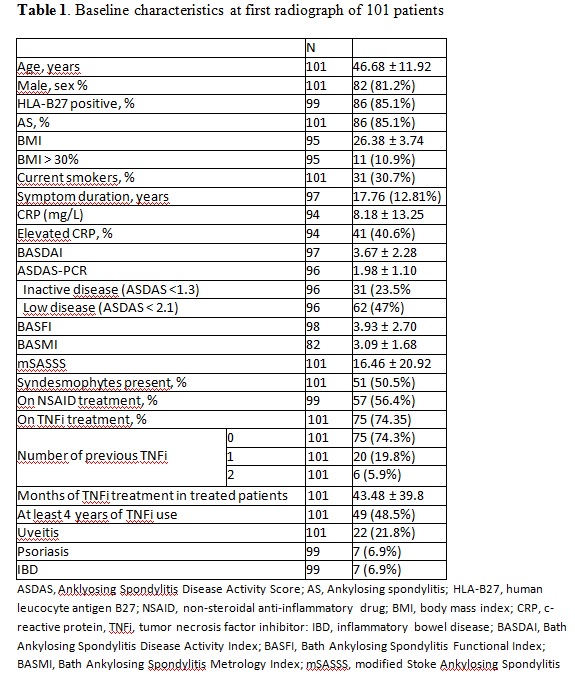Session Information
Date: Monday, November 9, 2020
Session Type: Poster Session D
Session Time: 9:00AM-11:00AM
Background/Purpose: Clinical efficacy of TNF inhibitors (TNFi) in axial spondyloarthritis (axSpA) has been widely probed in randomized control trials. In clinical practice, some studies suggested that long-term treatment with TNFi (more than 4 years) could slow down radiographic progression in axSpA. Furthermore, it is thought that the effect of TNFi on radiographic progression may be mediated by reducing disease activity.
To evaluate the effect of maintenance of low disease activity on radiographic progression in axSpA patients treated with TNFi.
Methods: Of the initial 204 patients a total of 101 patients with axSpA, 31 starting TNFi and 75 previously treated with TNFi, from the Spanish Register of Biological Therapy in Spondyloarthritides (REGISPONSERBIO) were included in the analysis based on the availability spinal radiographs (cervical and lumbar spine lateral views) at two time points and clinical data. Paired cervical and lumbar spine radiographs were available on all patients at a minimum interval of 2 years (mean 3.45±0.978 years; range 2 to 5 years). Two trained readers, independently and with known chronological order, scored lateral cervical and lumbar spine images according to the mSASSS system (0-72). Following definitions for progression were used: change of the absolute scores, change of ≥2 points, development of new syndesmophytes, and development of new syndesmophytes or growth of the existing syndesmophytes. Disease activity was reported with ASDAS-PCR every 6 months in a 3-year period.
Results: Baseline characteristics of patients at first radiograph are presented in Table 1. Reliability of both readers was excellent with intraclass correlation coefficients (ICCs) of 0.986 (0.979-0.990) at inclusion and 0.981 (0.972-0.987) at follow-up. The mean±SD score at inclusion was 16.46±20.92, the change score between inclusion and follow-up was 1.98±0.83 and the smallest detectable change of progression was of 2.26 mSASSS units. Development of new syndesmophytes was present in 20 patients (15.2%) and growth of the existing syndesmophytes or new syndesmosphytes was present in 22 (21.8%). Data on disease activity in at least 3 time point in a 3-year period was available in 93 patients, of those 25 (26.9%) patients remain with persistent inactive disease and 65 (69.9%) with persistent low disease activity. In the multivariate analysis, adjusted for multiple baseline clinical and demographic characteristic, only the maintenance of low disease activity was significantly associated with a lower development of new syndesmophytes, OR 0.21 (95% CI 0.05-0.91) p=0.04 (Table 2).
Conclusion: Persistence of low disease activity in patients under TNFi seems to be the most important factor to slow down spinal radiographic progression in axSpA.
To cite this abstract in AMA style:
Llop M, Moreno M, Gratacós J, Navarro-Compán V, De Miguel E, Font P, Clavaguera T, Linares L, Joven B, Juanola X. Radiographic Progression in Patients with Axial Spondyloarthritis Under Treatment with TNF Inhibitors. Data from REGISPONSERBIO (Spanish Register of Biological Therapy in Spondyloarthritides) [abstract]. Arthritis Rheumatol. 2020; 72 (suppl 10). https://acrabstracts.org/abstract/radiographic-progression-in-patients-with-axial-spondyloarthritis-under-treatment-with-tnf-inhibitors-data-from-regisponserbio-spanish-register-of-biological-therapy-in-spondyloarthritides/. Accessed .« Back to ACR Convergence 2020
ACR Meeting Abstracts - https://acrabstracts.org/abstract/radiographic-progression-in-patients-with-axial-spondyloarthritis-under-treatment-with-tnf-inhibitors-data-from-regisponserbio-spanish-register-of-biological-therapy-in-spondyloarthritides/


